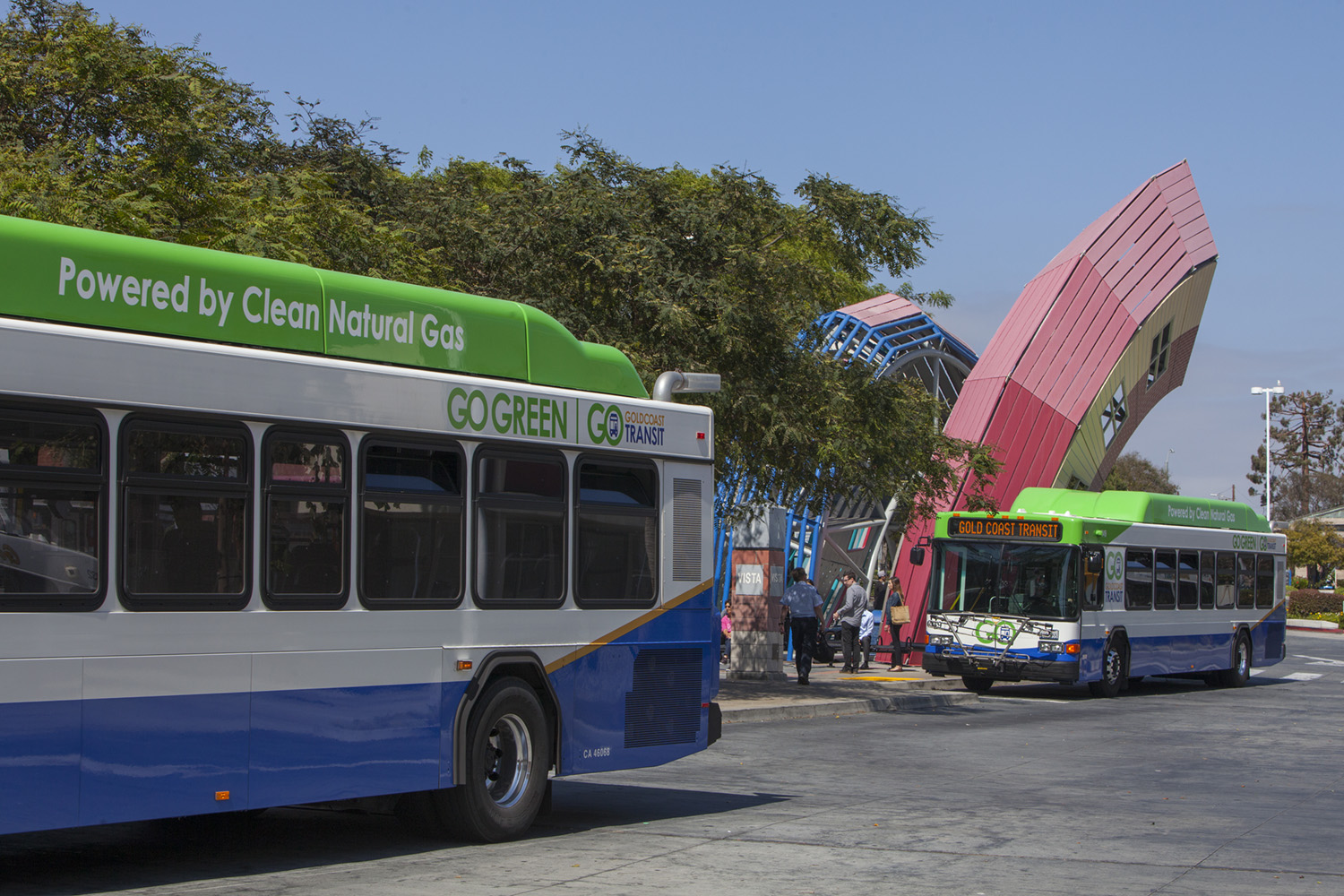Zero Emissions Planning
Gold Coast Transit District (GCTD) currently maintains and operates a fleet of 111 vehicles comprised of buses, paratransit vehicles and non-revenue vehicles. As a recipient of federal funds under Federal Transit Administration (FTA) Programs 5307 and 5339, GCTD is responsible for ensuring compliance with federal requirements related to fleet acquisition, operations, and maintenance.

Zero Emissions By 2040
GCTD is committed to clean transportation. GCTD’s transition plan to reach Zero Emissions by 2040 is currently being developed. To date several actions have been completed including:
-
2018 - Adoption of Zero Emissions Policy & Transit Management Plan
In June 2018, the Board Adopted a Zero / Near-Zero Emissions Policy which directs staff to prioritize zero emissions (or near zero) when replacing vehicles.
In September 2018, GCTD completed a Transit Asset Management (TAM) Plan as required by the FTA. Its purpose is to present a strategic approach to set objective standards for measuring the condition of capital assets and establish performance measures for state of good repair.
-
2019 - Statewide Regulations On Future Planning
In 2019, the California Air Resources Board (CARB) adopted the Innovative Clean Transit Regulation, which requires all transit fleets in California to plan for the transition of their fleet to zero emissions by 2040. To meet this goal, GCTD will need compete for grant funding, from local, state, and federal programs. In addition, CARB requires all transit agencies to develop and adopt a zero-emissions fleet transition plan by 2023.
-
2020 - Power Train Replacement Project
In 2020, GCTD completed a “Power Train Replacement” project on 14, 2006, New Flyer, 40 ft. buses. This power train replacement included a new CNG L9N “Near Zero” Engine, a rebuilt Allison transmission and an all-electric cooling system was also added.
-
2021 - Replacing Aging GCTD Fleet and Planning for Zero Emissions
In 2021 GCTD began a campaign of replacing aging fleet and establishing a contingency fleet to ensure available vehicles for operational needs. By 2026, 31 buses will exceed their useful life. The estimated funding needs to replace all these vehicles is over $22,000,000. Of these, 26 New Flyer buses have CNG fuel tanks that will expire in 2026. The expiration date is a HARD date and cannot be extended without replacement of the CNG cylinder tanks.
Identification of funding and Procurement of these buses must begin well in advance of the expiration date.
Additionally in 2021, GCTD hired STANTEC, Inc to begin consulting on the development of our agency-wide Zero Emissions Transition Plan. This plan will help guide the transition of our fleet of over 90 vehicles into zero emissions by 2040, as well as develop and propose strategies for funding this effort.
-
GCTD's Zero Emissions Transition Efforts Backed by $12.1 Million FTA Grant Award
August 2022 – Gold Coast Transit District (GCTD) announced it has been selected as a recipient of a grant award from the U.S. Department of Transportation’s Federal Transit Administration (FTA) in the amount of $12,117,144 to purchase hydrogen fuel cell electric buses, install a new hydrogen fueling station, and implement a robust workforce development and training program.
The grant award – made under FTA’s Buses and Bus Facilities and Low and No-Emission Vehicle programs – is part of the FTA’s announcement to invest $1.66 billion into 150 transit agencies across the nation, in efforts to meet President Biden’s goal of net-zero emissions by 2050. The funding will be used to replace thousands of older bus models, with new zero-emission transit buses across the country. GCTD is one of 17 agencies selected to receive this grant in California.
GCTD will be partnering with New Flyer and the Center for Transportation and the Environment (CTE) to deploy five (5) 40’ New Flyer hydrogen fuel cell electric buses (FCEBs), construct a hydrogen fueling station that will support at least 50 buses which allows for future expansion, and complete maintenance facility upgrades to add hydrogen detection and alarming capabilities. While GCTD currently has several electric sedans and vans, this grant will fund the first heavy-duty zero-emission buses in the fleet.
“This funding will allow GCTD to take a momentous step forward in realizing our vision – to provide equitable and environmentally responsible public transportation, connect people to opportunities, and prepare our workforce for a future in zero emissions technology.” said GCTD General Manager, Vanessa Rauschenberger. “I am especially thankful to the collaborative efforts of our employees, as well as community leaders and organizations who provided letters of support to the FTA to advocate for this grant award.”
-
Ventura County Clean Air Summit and Expo - Hosted by GCTD on Wednesday, October 12, 2022
GCTD is committed to clean air and fostering a healthier environment for Ventura County residents. At this inaugural summit and expo, GCTD invited key stakeholders and experts in clean transportation and climate action to convene and discuss pressing topics in clean energy hydrogen fuel cell, micro-mobility, and vehicle electrification, while exploring other opportunities and connecting with leaders in both the public and private sector. Thanks to our event partner and title sponsor, the Ventura County Transportation Commission, for helping make this event possible.
The event was attended by over 100 guests and was a great example of public and private partnerships. Watch the event highlights here.
-
GO-ing Green: Stakeholder Engagement Workshop - Hosted by GCTD on Wednesday, May 17, 2023
On May 17th, GCTD and the Center for Transportation and the Environment (CTE) hosted a public stakeholder workshop at the GCTD Operations and Maintenance Facility. The workshop allowed the community to learn more about our efforts to reach our zero emissions goal with our GO-ing Green Hydrogen Fuel Cell transition project.
You can view the presentation slides here: